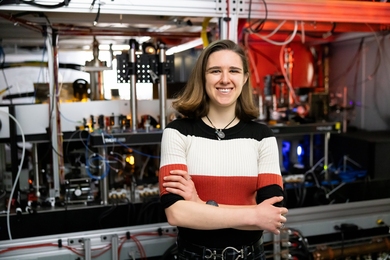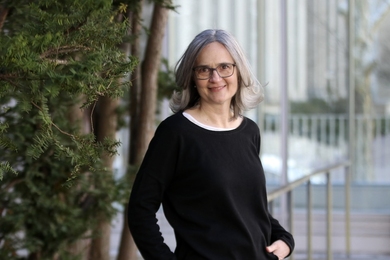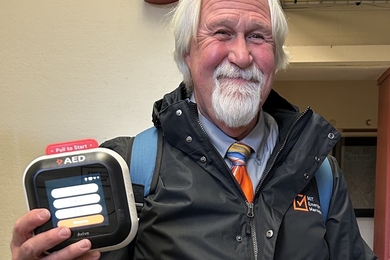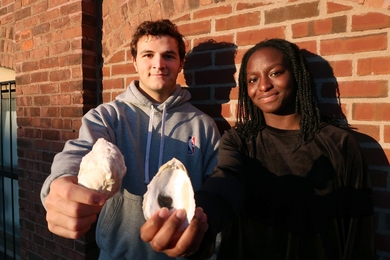MIT was presented with one of seven "Partners in Commuter Transportation" awards given by Caravan for Commuters, Inc. of Boston on October 21. The Institute was publicly thanked for its "cooperative and affirmative" transportation initiatives such as the T-Pass subsidy program, the annual commuter fair, the neighborhood shuttle, Safe Ride, the Lincoln Lab shuttle, involvement in the Charles River Transportation Management Association, and trip-mitigation efforts including raised parking fees and the restricted allocation of parking permits. These programs are managed by Robert Simha and Lydia Snover in the Planning Office.
Associate Professor of Chemistry Gregory Fu won the 1998 Arthur C. Cope Scholar Award from the American Chemical Society for "outstanding chemistry research in assembling precise building blocks with which pharmaceutical companies can make drugs." Dr. Fu develops reactions that can generate compounds in their proper mirror image.
Many molecules come in two forms that are identical except in their orientation -- they are mirror images of each other. But in the body, the enzymes that orchestrate digestion, repair and other chemical processes are so specific that they can interact with only one form. Until about 10 years ago, the majority of pharmaceuticals were mixtures of the mirror images, Dr. Fu explained.
Often the oppostite form of the intended compound is inactive, but sometimes they find a target. For example, one form of thalidomide was biologically inert except during a brief window of pregnancy when it caused serious birth defects. The Food and Drug Administration now considers a drug's mirror image an impurity, and manufacturers must priove it clinically harmless if they want to leave it in. Dr. Fu starts with a 50-50 mixture of mirror images "and then we react one form away" using specifically designed catalysts.
Professor Sheldon Penman of the Department of Biology received the 18th annual E.B. Wilson Award from the American Society for Cell Biology (ASCB) in recognition of significant and far-reaching contributions to cell biology. Professor Penman will share the 1998 award with Dr. James E. Darnell of Rockefeller University. The E. B. Wilson Award is the highest scientific honor conferred by the ASCB and is the highest award in cell biology.
Senior research scientist Simon Foner of the Francis Bitter Magnet Laboratory has been awarded the 1999 Joseph F. Keithley Award by the American Physical Society. Dr. Foner was recognized "for the invention and development of the vibrating sample magnetometer and many of its successful applications, and for the innovative development of very high field pulsed magnets."
Professor of Civil and Environmental Engineering Herbert H. Einstein has received the M������ller Award from the International Society for Rock Mechanics (ISRM), a professional society with 5,500 members from 42 nations. Professor Einstein, who received the award "in recognition of his distinguished contributions to the profession of rock mechanics and rock engineering," will deliver the M������ller Lecture at the 1999 ISRM Congress in Paris.
Christopher Pratt, director of the Office of Career Services and Preprofessional Advising, has been named to a two-year term as an at-large college representative to the board of governors of the National Association of Colleges and Employers (NACE). NACE is the national professional organization for human-resources professionals who recruit and hire college graduates, and for career-services practitioners on college campuses.
Institute Professor Noam Chomsky of linguistics has been awarded one of eight 1999 Benjamin Franklin Medals in Science given by the Franklin Institute, founded in 1824 to promote scientific inquiry and achievement. He is a medal co-winner with Douglas C. Englebart, inventor of the computer mouse and winner of the 1997 Lemelson-MIT Prize. Dr. Chomsky was recognized for "developing a system of linguistic analysis that is the basis for computer languages and [providing] insight into the process of human thought."
Joseph Sussman, the J.R. East Professor in the Department of Civil and Environmental Engineering, received a Technical Leadership Award from Move Massachusetts 2000, a coalition of business, labor, environmental and professional organizations which aim to develop a regional transportation strategy. Professor Sussman was one of those recognized for contributing to the successful completion of the Central Artery/Tunnel Project's traffic mitigation program. He is chairman of the Artery Business Community's Traffic Management Subcommittee. The award winners' "responsive and remarkably unobtrusive traffic mitigation measures have permitted the city and the region to continue to thrive throughout the construction period," the citation said.
John A. Tucker, retired lecturer in electrical engineering and computer science and director of the depart-ment's VI-A internship program, has been selected as the 1998 National Outstanding Advisor of the Tau Beta Pi (TBP) engineering honor society. Mr. Tucker continues as chief advisor on the TBP Advisory Board. As part of the award, the School of Engineering received a $1,000 grant.
A version of this article appeared in MIT Tech Talk on October 28, 1998.





